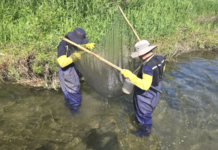
On Nov. 29, the NIFoS announced that ant habitats are gradually moving on average 4.9 meters in altitude up mountain slopes every year due to climate change.
The National Institute of Forest Science (NIFoS), the national research institute under the Korea Forest Service (KFS), has announced that due to global warming, climate-sensitive organisms are moving to higher elevations in alpine areas. Furthermore, for many life forms already living at higher altitudes, as temperatures warm there’s nowhere to go higher up, so some species are expected to go extinct in the future.
The institute began its research in 2007 and has observed the distribution of ant habitats at over 300 mountains across Korea. It has concluded that global warming is causing a loss of species.
Currently, ant species are most diverse at 263 meters above sea level. However, climate change is driving them to move up 4.9 meters per year. By 2080, similarly high levels of ant diversity are expected to exist at around 656 meters above sea level.
Moreover, the population of genus Myrmica ants that live in alpine areas above 1,000 meters is going to slowly decline and become rare by 2090. These types of ants help spread seeds of rare herbs that grow high in the mountains and feed rare butterflies, such as the Maculinea arionides and Maculinea teleius that live at high altitudes. A decrease in the number of ants may have negative effects on uncommon herbs and butterflies.
Meanwhile, results of this research were featured in PLOS One, a scientific journal published by the U.S. Public Library of Science. “It’s meaningful research, considering that it proved the vulnerability of species diversity atop high mountains due to global warming,” said an official from the NIFoS. “Particularly, it’s unprecedented to identify it with the diversity of ants,” he said.
By Kim Young Shin
Korea.net Staff Writer
Photo: Korea Forest Service
ysk1111@korea.kr























